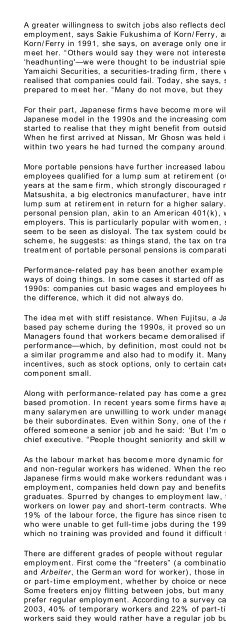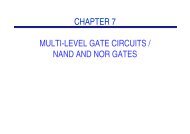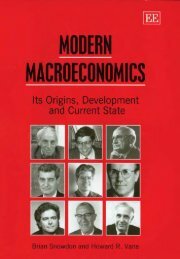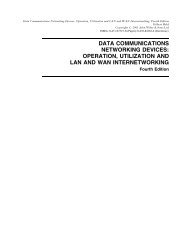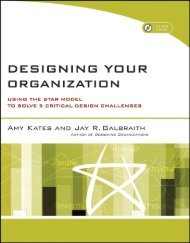The Economist December 1st 2007 - Online Public Access Catalog
The Economist December 1st 2007 - Online Public Access Catalog
The Economist December 1st 2007 - Online Public Access Catalog
- No tags were found...
You also want an ePaper? Increase the reach of your titles
YUMPU automatically turns print PDFs into web optimized ePapers that Google loves.
A greater willingness to switch jobs also reflects declining confidence in the guarantee of lifetimeemployment, says Sakie Fukushima of Korn/Ferry, an executive-search firm. When she moved toKorn/Ferry in 1991, she says, on average only one in ten of the candidates she called was prepared tomeet her. “Others would say they were not interested in moving or were scared by the term‘headhunting'—we were thought to be industrial spies.” But after the dramatic collapse in 1997 ofYamaichi Securities, a securities-trading firm, there was “a huge change in psychology” as peoplerealised that companies could fail. Today, she says, seven or eight out of ten people she contacts areprepared to meet her. “Many do not move, but they are interested to see what their options are.”For their part, Japanese firms have become more willing to hire outsiders. With the fall from grace of theJapanese model in the 1990s and the increasing competitiveness of foreign firms, Japanese companiesstarted to realise that they might benefit from outside expertise. <strong>The</strong>re was also a “Carlos Ghosn” effect.When he first arrived at Nissan, Mr Ghosn was held in contempt by the corporate establishment. Butwithin two years he had turned the company around, prompting a rethink among Japanese bosses.More portable pensions have further increased labour mobility. Under the traditional Japanese system,employees qualified for a lump sum at retirement (over and above the state pension scheme) after 30years at the same firm, which strongly discouraged mid-career moves. But some firms, most famouslyMatsushita, a big electronics manufacturer, have introduced a new scheme in which employees waive thelump sum at retirement in return for a higher salary. <strong>The</strong>y can then put some of their extra pay into apersonal pension plan, akin to an American 401(k), which they can take with them if they switchemployers. This is particularly popular with women, says Mr Kawamoto. Workers who opt for it do notseem to be seen as disloyal. <strong>The</strong> tax system could be changed to encourage more people to use thescheme, he suggests: as things stand, the tax on traditional retirement income is low, but the taxtreatment of portable personal pensions is comparatively ungenerous.Performance-related pay has been another example of Japanese firms' experimentation with Americanways of doing things. In some cases it started off as a form of wage restraint in the dark days of the1990s: companies cut basic wages and employees hoped that performance-related pay might make upthe difference, which it did not always do.<strong>The</strong> idea met with stiff resistance. When Fujitsu, a Japanese computer giant, introduced a performancebasedpay scheme during the 1990s, it proved so unpopular that the company had to scale it back.Managers found that workers became demoralised if they were not given above-average grades forperformance—which, by definition, most could not be. NEC, another Japanese computer giant, introduceda similar programme and also had to modify it. Many firms now offer performance-based pay and otherincentives, such as stock options, only to certain categories of worker, and keep the performance-relatedcomponent small.Along with performance-related pay has come a greater emphasis on meritocratic rather than senioritybasedpromotion. In recent years some firms have appointed younger chief executives, in their 50s, butmany salarymen are unwilling to work under managers who are younger than themselves or who used tobe their subordinates. Even within Sony, one of the most Americanised companies, old habits die hard. “Ioffered someone a senior job and he said: ‘But I'm only 48!',” says Sir Howard Stringer, the company'schief executive. “People thought seniority and skill were totally intertwined.”As the labour market has become more dynamic for regular workers, however, the gulf between regularand non-regular workers has widened. When the recession took hold in the early 1990s, the idea thatJapanese firms would make workers redundant was unthinkable. Instead, to maintain lifetimeemployment, companies held down pay and benefits for existing employees and stopped hiring newgraduates. Spurred by changes to employment law, they also began to take on more non-regularworkers on lower pay and short-term contracts. Whereas in 1994 non-regular workers accounted for only19% of the labour force, the figure has since risen to 33%. This created a “lost generation” of graduateswho were unable to get full-time jobs during the 1990s, got stuck in low-paid, non-regular positions inwhich no training was provided and found it difficult to move into regular employment.<strong>The</strong>re are different grades of people without regularemployment. First come the “freeters” (a combination of “free”and Arbeiter, the German word for worker), those in temporaryor part-time employment, whether by choice or necessity.Some freeters enjoy flitting between jobs, but many wouldprefer regular employment. According to a survey carried out in2003, 40% of temporary workers and 22% of part-timeworkers said they would rather have a regular job but could not


